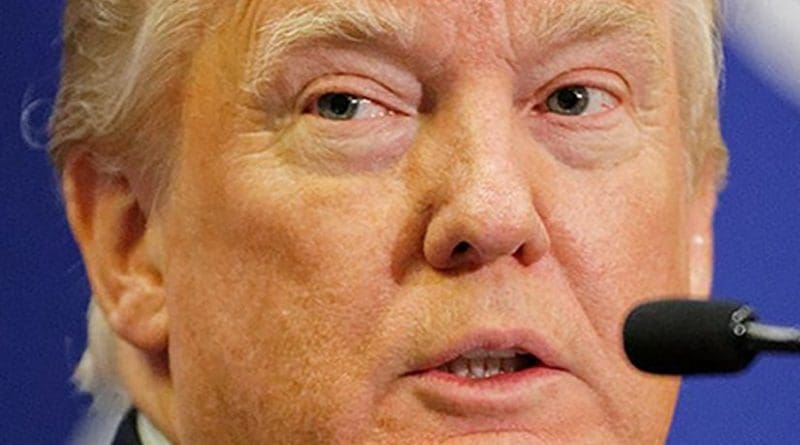Trump In Israel Slams ‘Terrible’ Iran Nuclear Accord
By RFE RL
(RFE/RL) — U.S. President Donald Trump slammed a “terrible” nuclear deal signed with Iran and said the country must stop supporting “terrorists and militia” and must “never ever” acquire nuclear weapons.
Speaking as he began a meeting in Jerusalem with Israeli Prime Minister Benjamin Netanyahu on May 22, Trump said the 2015 international nuclear accord made Iran feel “invulnerable” and that its support of violent groups in the Middle East created an opening for Israel to move toward countries in the Gulf, even those which do not have diplomatic relations with Israel.
“We gave [Iran] a lifeline, we gave them wealth and prosperity, and the ability to continue with terror,” Trump told reporters as he headed into a meeting with the Israeli prime minister just hours after he arrived in Israel and delivered an upbeat message about the prospects for progress toward peace in the Middle East.
Trump, on his first trip abroad since taking office in January, arrived from Saudi Arabia earlier in the day for a two-day visit to Israel and said there is a “rare opportunity” to bring peace to the Middle East.
At a welcoming ceremony on the tarmac shortly after arriving in Tel Aviv, Trump said he wanted to “reaffirm the unshakable bond” between the United States and Israel.
In a meeting earlier in the day with his Israeli counterpart, Reuven Rivlin, Trump suggested that Iran’s actions had sparked concern among other countries in the region, which are eager curb Tehran’s influence, and made them more sympathetic toward Israel.
“Most importantly the United States and Israel can declare with one voice that Iran must never be allowed to possess a nuclear weapon — never ever — and must cease its deadly funding, training and equipping of terrorists and militias,” Trump said.
“And it must cease immediately … Now we must work together to build a future where the nations of the region are at peace,” Trump said, adding he had “found new reasons for hope” during his trip, which began in Saudi Arabia on May 20.
Netanyahu thanked Trump for what he called a “powerful expression” of support for Israel, noting that he is the first U.S. president to make Israel a stop on his first trip abroad.
“May your first trip to our region prove to be a historic milestone on the path towards reconciliation and peace,” Netanyahu said.
Trump also became the first sitting U.S. president to visit Jerusalem’s Old City — first stopping at the Church of the Holy Sepulchre, considered the holiest Christian site in the world.
Wearing a black kippah — a Jewish skullcap — he visited the Western Wall, touching the ancient wall that is considered one of Judaism’s holiest sites.
Shortly before landing on Air Force One with Trump, U.S. Secretary of State Rex Tillerson said: “We have the opportunity to advance the peace discussions between the Israelis and the Palestinians.”
In Riyadh on May 21, Trump attended a summit of leaders of mainly Muslim counties and called for a “coalition of nations” in the Middle East to come together with the aim of “stamping out extremism.”
Trump told the leaders that a “better future is only possible if your nations drive out the terrorists and extremists. Drive them out. Drive them out of your places of worship. Drive them out of the holy land.”
Trump is to hold talks with Netanyahu later on May 22 and meet with Abbas in Bethlehem, in the West Bank, on May 23.
Trump’s aides have played down expectations for a major breakthrough, however, saying the visit should be seen more as a symbolic gesture.
Tillerson told reporters en route to Tel Aviv that any three-way meeting between Trump, Netanyahu, and Palestinian President Mahmud Abbas was for “a later date.”
In an interview with the Israel Hayom newspaper, U.S. Ambassador David Friedman said Trump’s goal for now is simply “to begin a discussion that would hopefully lead to peace.”
Before Trump arrived, Israeli authorities approved some economic concessions to the Palestinians that the U.S. president had requested.
“The security cabinet has approved economic measures that will ease daily civilian life in the Palestinian Authority after [Trump], who arrives tomorrow, asked to see some confidence-building steps,” a cabinet statement said on May 21.
The concessions included construction permits for Palestinians in sections of the West Bank that are under Israeli control, areas where Palestinians have previously been barred, officials said.
Israeli media reported the concessions also included keeping a border crossing between the West Bank and Jordan open 24 hours a day.
Israel is a longtime staunch U.S. ally, but Trump is still likely to have some tough discussions.
He may be asked for explanations following media reports that he disclosed highly classified intelligence that Israel obtained about the Islamic State (IS) militant group to top Russian officials without Israel’s permission.
Israel also expressed concern about the $110 billion arms sale to Saudi Arabia that Trump announced on May 20 in Riyadh, with one official saying it was “definitely something that should trouble us.”
Trump has also backed off of a vow made during his presidential campaign to move the U.S. Embassy from Tel Aviv to Jerusalem.
The status of Jerusalem is one of the most sensitive issues of the Palestinian-Israeli conflict.
Palestinians regard Jerusalem as the capital of their future state.
Israel captured East Jerusalem from Jordan during the 1967 Six-Day War, annexed It, and declared all of the city as its capital, a move never recognized by the international community.

